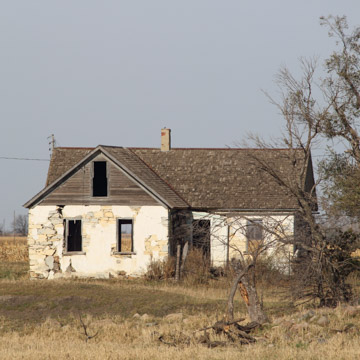The Martin Honner House, located west of Tabor, is a surviving example of South Dakota’s Czech folk architecture. Czech families began immigrating to the state in 1869, concentrating their settlements in the state’s southeastern corner in Bon Homme and Yankton counties. They brought with them central European building traditions, primarily those associated with Bohemia. In 1870, Martin Honner moved to Dakota Territory with his parents and brother and settled near Tabor, where they were active in the community and charter members of St. Wenceslaus Catholic Church. Honner built this structure sometime during the 1880s.
The house exemplifies the traditional three-bay, L-shaped form often seen in Czech residences. Like other examples, the perpendicular gables face south and east, with stairways in the northeast and northwest bays. The house is constructed of soft chalkrock mortared with clay; it is covered with a stucco finish coat. Chalkrock is a limestone material that forms cliffs along the Missouri River; it was a popular building material in areas between the territorial capital city of Yankton and Fort Thompson. Because the stone is so soft, it could be cut by hand and required no specialized tools, making it a useful material for settlers. The yellowish stone hardened with time, creating a durable building material that was used for both foundations and wall construction. The Martin Honner House, however, sits on a rubblestone foundation. The house also features a wood-shingled roof and pressed brick chimney.
Chalkrock was used for several buildings in Bon Homme and Yankton counties, including houses, a water-powered mill, churches, and schools. By the turn of the century, other building materials found favor. Interest in chalkrock was revived in the 1930s under the New Deal–funded Sioux Rehabilitation Colonies, which featured chalkrock cottages at the Rising Hail Colony on the Yankton Reservation.
The Martin Honner House is currently abandoned and deteriorating, although it is still in private ownership of the Honner descendants.








